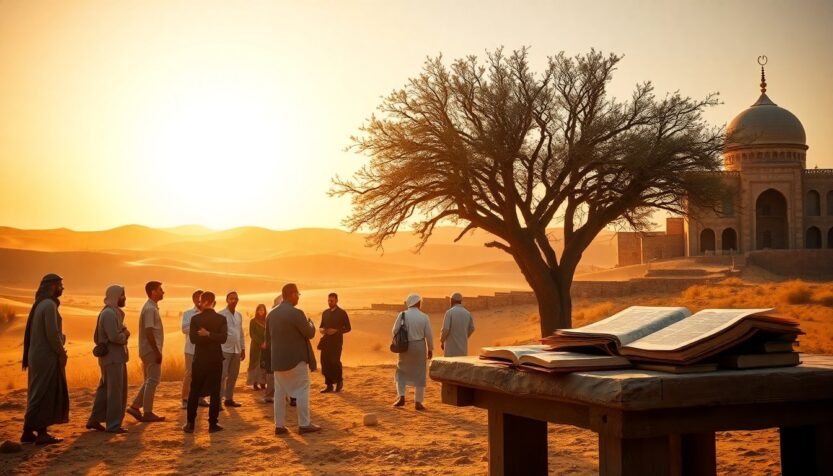The life of Muhammad serves as a profound lens through which to understand the principles of Islam and their relevance in today’s world. Born around 570 CE in the tribal society of Arabia, Muhammad’s upbringing was marked by personal loss and societal strife, setting the stage for his later revelations and teachings.
In an environment rife with inequality, where power dynamics dictated social standing, Muhammad emerged as a figure of integrity and compassion. His journey from an orphan raised by relatives to a spiritual leader illustrates the transformative impact of his experiences in shaping his worldview.
The early years and spiritual awakening
Mecca, the city of Muhammad’s birth, was dominated by the Kaaba, an ancient shrine that attracted polytheistic pilgrims. This religious tourism enriched the elite, ensuring the continuation of their privileged status while marginalizing the less fortunate. Muhammad’s early life, characterized by the loss of his father and mother, instilled in him a deep sense of empathy for the vulnerable.
At the age of 25, he married Khadijah, a wealthy widow, and their partnership was marked by mutual respect and support. Muhammad’s life took a pivotal turn at the age of 40 during a period of meditation in a cave. It was here that he encountered the Angel Gabriel, receiving the first of many revelations that would form the basis of the Qur’an.
Foundations of a new faith
Over the next two decades, Muhammad revealed teachings that emphasized the oneness of God, known as Allah, and the fundamental equality of all individuals before Him. The core tenets of Islam emerged: Salah (the five daily prayers), Zakat (compulsory charity), Sawm (fasting during Ramadan), and Hajj (the pilgrimage to Mecca). These practices were designed to foster community and ensure that wealth circulated fairly among all members of society.
As these revelations gained traction, Muhammad attracted a following that included women, slaves, and the destitute, all of whom found a voice and purpose in his teachings. However, the existing power structures in Mecca perceived Muhammad’s message as a direct threat, leading to widespread persecution of him and his followers.
Migration and the establishment of community
In 622 CE, facing imminent danger, Muhammad and his followers migrated to Medina, a city plagued by tribal conflicts. This migration, known as the Hijra, marked a significant turning point in Islamic history, establishing the basis for the Islamic calendar. In Medina, Muhammad was welcomed as a neutral mediator, uniting various tribes under the Constitution of Medina, one of the earliest known written constitutions that guaranteed rights for all residents and ensured justice.
The community flourished, and by the time of Muhammad’s return to Mecca in 630 CE with a force of 10,000 followers, he was not only a spiritual leader but also a political figure advocating for peace and forgiveness. Upon entering Mecca, he removed the idols from the Kaaba and rededicated it to the worship of Allah, extending amnesty to those who had once sought his life.
Legacy and lasting principles
The principles that Muhammad espoused laid the groundwork for a thriving civilization that would expand across vast territories, from Spain to India. The Islamic Golden Age, spanning from the 8th to the 14th centuries, was marked by advancements in various fields, including science, philosophy, and commerce, all underpinned by the egalitarian ethos of Islam.
Modern scholars continue to grapple with the interpretations of Muhammad’s teachings, especially those pertaining to conflict. While some verses have been used to justify violence, the overwhelming majority of Muslims interpret these within their historical context, emphasizing peace and community cohesion. The challenge remains to uphold the core values of compassion and justice while navigating contemporary global issues.
In an environment rife with inequality, where power dynamics dictated social standing, Muhammad emerged as a figure of integrity and compassion. His journey from an orphan raised by relatives to a spiritual leader illustrates the transformative impact of his experiences in shaping his worldview.0

